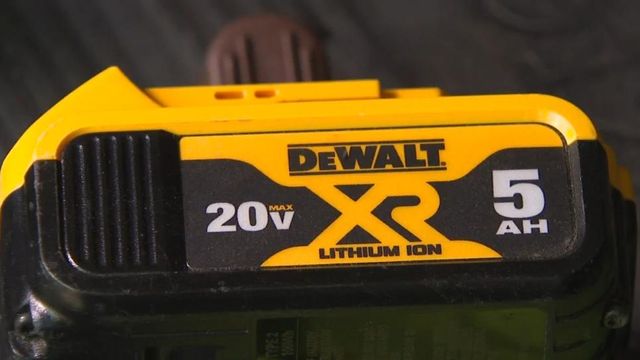5 On Your Side: How hazardous are lithium-ion batteries?
Recent lithium-ion battery fires got us thinking - how safe are they?
In March, there was an e-bike battery fire that seriously damaged a home in Raleigh.
In January, a car battery exploded when the owner removed it from the car and tried to charge it inside their house.
There have also been multiple, recent recalls from the Consumer Product Safety Commission for other lithium-ion battery products.
These batteries power our phones, toys, lawn tools and so much more. 5 On Your Side spoke to an expert about how concerned we should be about these being scattered through our homes.
Dr. Bryan Staley is with the Environmental Research & Education Foundation. His expertise extends to lithium-ion batteries, but that doesn't mean he's immune to the risk they can carry.
"I had my own experience where I had one of these exploded my hand. So I'm probably a little more gun shy than the average consumer," Staley said.
The battery for one of his child's toys erupted, charring some mulch, but thankfully that was the worst of it.
"[Lithium-ion] are different than your standard alkaline batteries," he explained.
Different, because they pack way more energy than a handful of AA's.
Staley said despite that, they're typically safe. The danger comes when you have a low-quality battery or charger.
"If you think about all of the incidences that have happened most recently, many of them have been attributed to E bikes and in part, because those are notorious for having substandard lithium-ion batteries in them." he said.
Staley said batteries or chargers from unknown sources, or from overseas, come with higher risk.
You can worry far less about charging your cell phone or the battery for your power tools because those high-quality name-brands have built-in safeguards.
However, if any lithium-ion battery is damaged, all bets are off.
"When you see swelling, typically, the clock is ticking for something bad to happen," Staley warned.
A couple of things to look for that will tell you about the quality of your battery:
- Does it have a UL certification? If it does, that means it's gone through safety testing.
- What kind of warranty comes with the battery?
- To avoid problems, stick to the charger that's made for that battery.
- If you need a replacement, get one from the manufacturer. Avoid knockoffs or generic replacements.
Staley said it's very rare for a battery to catch fire or explode for no reason and taking care of them keeps the risk low.
"These things are used everywhere. So they're not going to go away. If anything, they're going to be in more things," Staley said.
If you're looking for extra protection, he suggested getting a fireproof battery storage bag. They come in a variety of sizes and aren't expensive.
If a battery being stored or charged inside one of these bags does catch fire, it buys you time to get it out of your home to minimize the damage.
When it's time to get rid of an aging or dead battery, Staley said make sure you're disposing of it in the proper place.
Lithium-ion batteries are frequently thrown in the trash and when they're compacted, start fires at waste centers.
Staley said turning lithium-ion batteries in at the proper recycling center or drop location will prevent these fires that put lives and property at risk.












